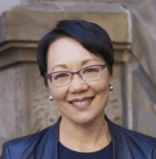I read with great interest my friend and colleague Rabbi Elliot Cosgrove’s recent Jewish Week opinion article “To Officiate Or Not At Intermarriages” (March 17). I certainly share his concern for Jewish continuity, and for the first decade of my rabbinate, I too did not officiate at interfaith marriages. I worried that asking a non-Jew to take a vow “under the laws of Moses and Israel” might undermine the integrity of the ceremony. I wanted to believe that my refusal to officiate might deter others from marrying out of the faith.
What I learned during those years is that refusing to stand under the chuppah with the children of our community does not prevent them from marrying the people they love. Instead, saying “No” often leads to a profound alienation from the Jewish community. It pains me now, looking back, to think of the many children of my congregation who came to me with their non-Jewish partners, committed to having a Jewish home, and how I turned them away. Many of them left synagogue life permanently. I could no longer bear the hypocrisy I felt in refusing to stand with them for one of the most important days of their lives, but then inviting them to become synagogue members the next day. This could not be the right decision for our Jewish future.
After 10 years of saying “No,” I decided there were times when I should say “Yes.” I still won’t perform every interfaith marriage. I do not officiate solely to mollify an upset grandparent, and I will not co-officiate with a leader from another faith; if the wedding is marking the end of a couple’s connection to Judaism, instead of a new beginning, then I have no proper place there. But I now am an impassioned supporter of rabbinic officiation for a couple who commits to the creation of a Jewish home (the very same standard I apply when asked to officiate at a wedding between two Jews). If a non-Jewish partner is willing to live in a home “under the laws of Moses and Israel,” to study Jewish laws and practice, and to raise any future children as Jews, then a rabbi can consecrate that commitment with integrity. We should feel gratitude for their interest and for the sacrifice some make in giving up their own prior religious practices. Without question, rabbinic officiation leads to greater engagement in Jewish life. The Brandeis Cohen Center study cited by Rabbi Cosgrove confirms that interfaith couples married by a rabbi as sole officiant are three times more likely to raise Jewish children, and are indistinguishable from “inmarried” couples across multiple measures of Jewish engagement.
Rabbi Cosgrove is correct that it is challenging to determine causation in cases where a couple seeks out a rabbi to officiate; such a couple may already be predisposed to pursue a Jewish life. But in a sample size of over 150 interfaith marriages at which my Central Synagogue colleagues and I have officiated in the last decade, I am confident that our decision to participate has played a role in their nearly universal subsequent engagement with Jewish life.
Once I started officiating interfaith weddings, I experienced the power of saying “Yes” to these interfaith couples who come to our doors. Rabbinic officiation is not just a symbolic act but a substantive opportunity for kiruv: drawing people close. My requirements for interfaith officiation include meaningful learning for the couple, often the most significant Jewish study that either partner has undertaken as an adult. In meetings to prepare for their wedding, they build a deep relationship with a rabbi. Then, on their wedding day — one of the most consequential and memorable days of their lives — Jewish ritual becomes the vehicle for their transformation into a family.
I no longer see the rate of intermarriage as a threat to Jewish survival, but rather as a potential opportunity for the Jewish community. At Central Synagogue, we have invested in this belief. Six years ago, my predecessor, Rabbi Peter Rubinstein, founded our Exploring Judaism (EJ) program. Led by Rabbi Lisa Rubin, EJ is a holistic program which not only includes a rigorous course of study, but also provides counseling, holiday observance and community involvement. Since its founding, EJ has welcomed nearly 600 students, the vast majority being young interfaith couples before marriage. EJ has brought 184 people to the mikvah, the ritual bath for conversion, and they are now counted among B’nai Yisrael, the children of Israel. They are often among the most engaged young people in our community. Judaism offers a life of beauty and purpose, and EJ is our unabashed welcome mat to any who might want to join us.
Of course, not everyone who takes the course decides to convert. Conversion is an intensely personal decision. But the non-Jews who emerge from EJ and are married by a rabbi also become our partners in creating and sustaining Jewish life. They frequently spur their Jewish spouses to be more Jewishly engaged. They bring their children to religious school and support b’nei mitzvah preparation. They become lay leaders and pray in our pews. They may not become b’nai Yisrael, but they become bonei Yisrael, builders of Israel and our communities. These b’nai and bonei Yisrael are deserving of our blessing under the chuppah. The future of the Jewish community will, in great measure, depend on them.
Rabbi Angela Warnick Buchdahl is senior rabbi of Central Synagogue in Manhattan. She is the daughter of an interfaith couple.
The New York Jewish Week brings you the stories behind the headlines, keeping you connected to Jewish life in New York. Help sustain the reporting you trust by donating today.





